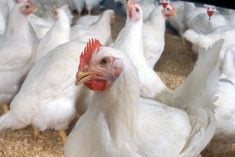Paris | Reuters — France sees crops developed using gene-editing techniques as different to genetically modified organisms (GMOs) and opposes a European Union court decision to put them under strict GMO regulations, the country’s agriculture minister said.
The European Court of Justice (ECJ) ruled in 2018 that mutagenesis, among so-called new breeding techniques (NBT) based on targeted editing of genes, fall under rules applying to GMOs that incorporate DNA from a different species.
The decision was welcomed by some environmentalists who have long opposed GMOs as a threat to ecosystems, and criticized by seed makers and scientists as penalizing Europe’s agricultural research capacity.
Read Also

U.S. grains: Soybeans bounce as Chinese demand assessed, wheat drops
Chicago soybean prices firmed on Friday in a bargain-buying bounce after a sharp fall on Thursday, as traders assessed prospects for more U.S. sales to China after the trade war truce between the countries.
“NBTs are not GMOs,” Agriculture Minister Julien Denormandie said in an interview published by several farming news outlets, including Agra Presse on Friday.
“This (NBT) technology allows much quicker development of a variety that could have emerged naturally at some point, and that is a very good thing,” he said, calling for NBT not to be regulated like GMOs.
The agriculture ministry confirmed the comments on Monday.
The EU’s executive in late 2019 requested a study on the issue that is due to be submitted by the end of April this year.
France is the EU’s largest agricultural producer and among EU members to have banned cultivation of GMO crops.
England’s farming minister announced earlier this month a public consultation on gene editing in agriculture, saying Britain’s exit from the EU allowed it to set its own rules.
The French government is also considering how to respond to a ruling last year by the country’s top administrative court requiring it to change its mutagenesis regulations in line with the EU court’s decision.
— Reporting for Reuters by Gus Trompiz in Paris.
















